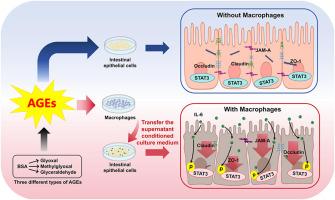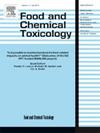Advanced glycation end products (AGEs) are a spectrum of complex compounds widely found in processed foods and frequently consumed by humans. AGEs are implicated in impairing the intestinal barrier, but the underlying mechanisms remain unclear. This study investigated the effects of three types of AGEs on gene expression of tight junctions (TJs) in colorectal epithelial HT-29 cells, and observed minimal alterations in TJs expression. Given the important role of subepithelial macrophages in regulating the intestinal barrier, we explored whether AGEs affect the intestinal barrier via the involvement of macrophages. Notably, a significant downregulation of TJs expression was observed when supernatants from AGEs-treated RAW264.7 macrophage cells were transferred to HT-29 cells. Further investigations indicated that AGEs increased IL-6 levels in RAW264.7 cells, subsequently triggering STAT3 activation and suppressing TJs expression in HT-29 cells. The role of STAT3 activation was confirmed by observing enhanced TJs expression in HT-29 cells following pretreatment with an inhibitor of STAT3 activation prior to the transfer of the conditioned medium. These findings demonstrated that AGEs impaired the intestinal barrier via macrophage-mediated STAT3 activation, shedding light on the mechanisms underlying AGEs-induced intestinal barrier injury and related food safety risks.

| 公司名称 | 产品信息 | 采购帮参考价格 | |
|---|---|---|---|
| 麦克林 | Formic acid |
≥99%
|
¥25.00~¥153438.80 |
| 麦克林 | Methanol |
≥99%
|
¥14.00~¥55867.47 |
| 索莱宝 | Lipopolysaccharides (LPS) |
|
|
| 索莱宝 | RIPA buffer |
|
|
| 索莱宝 | IL - 6 ELISA kit |
|
|
| 上海源叶 | Cellulose dialysis membrane |
|
|
| 麦克林 | Glyoxal (GO) |
|
|
| 麦克林 | Methylglyoxal (MGO) |
|
|
| 麦克林 | Glyceraldehyde (GAD) |
|


